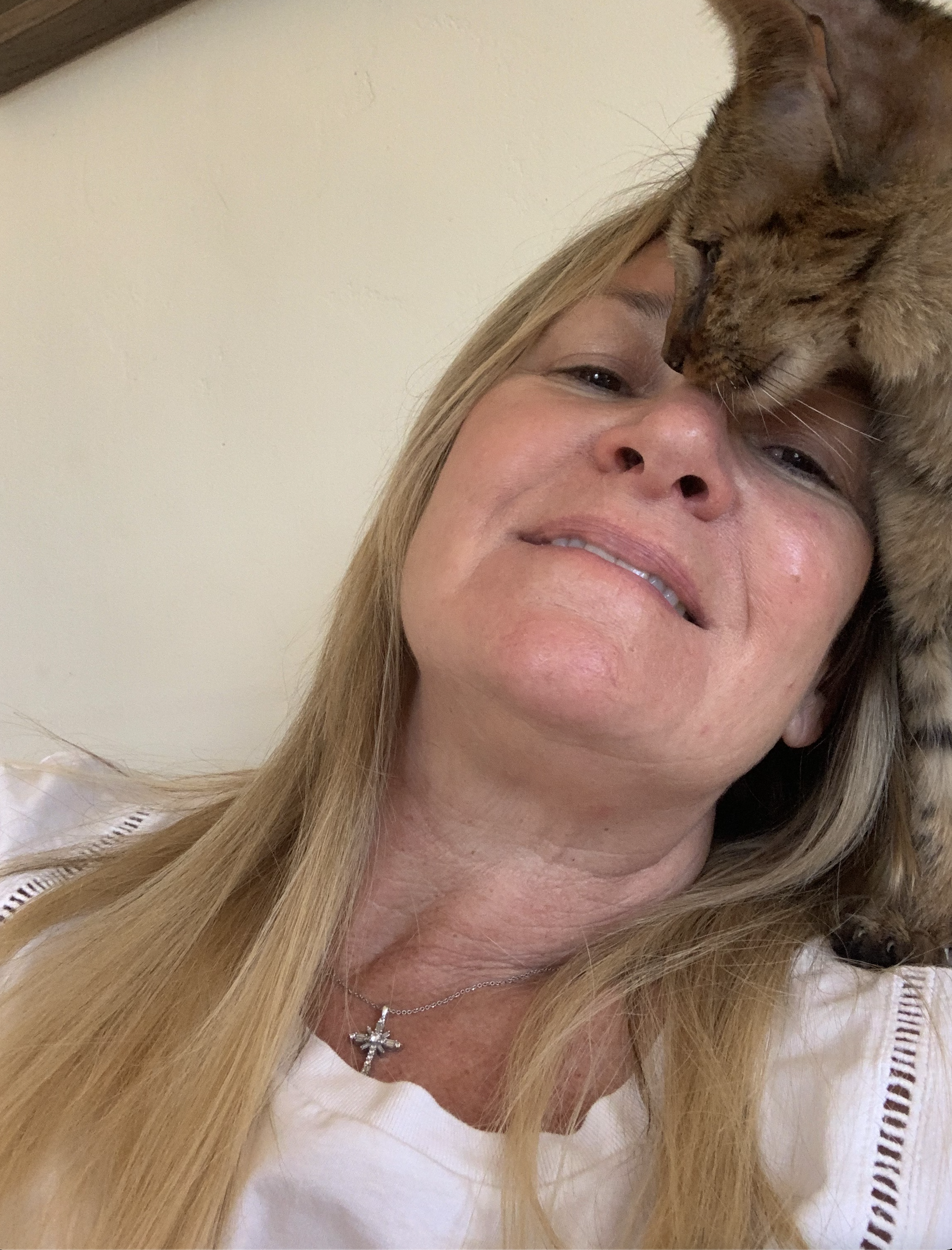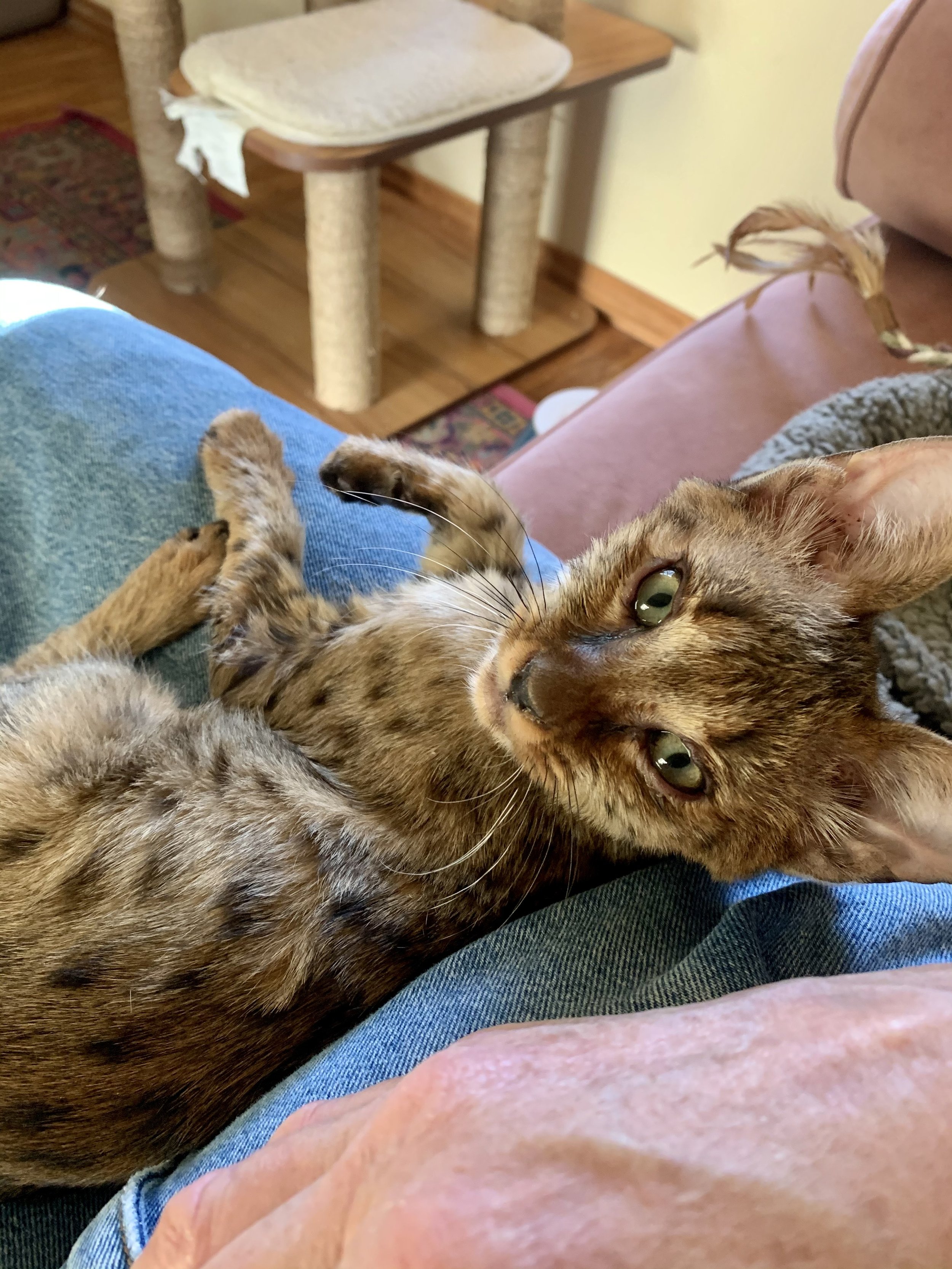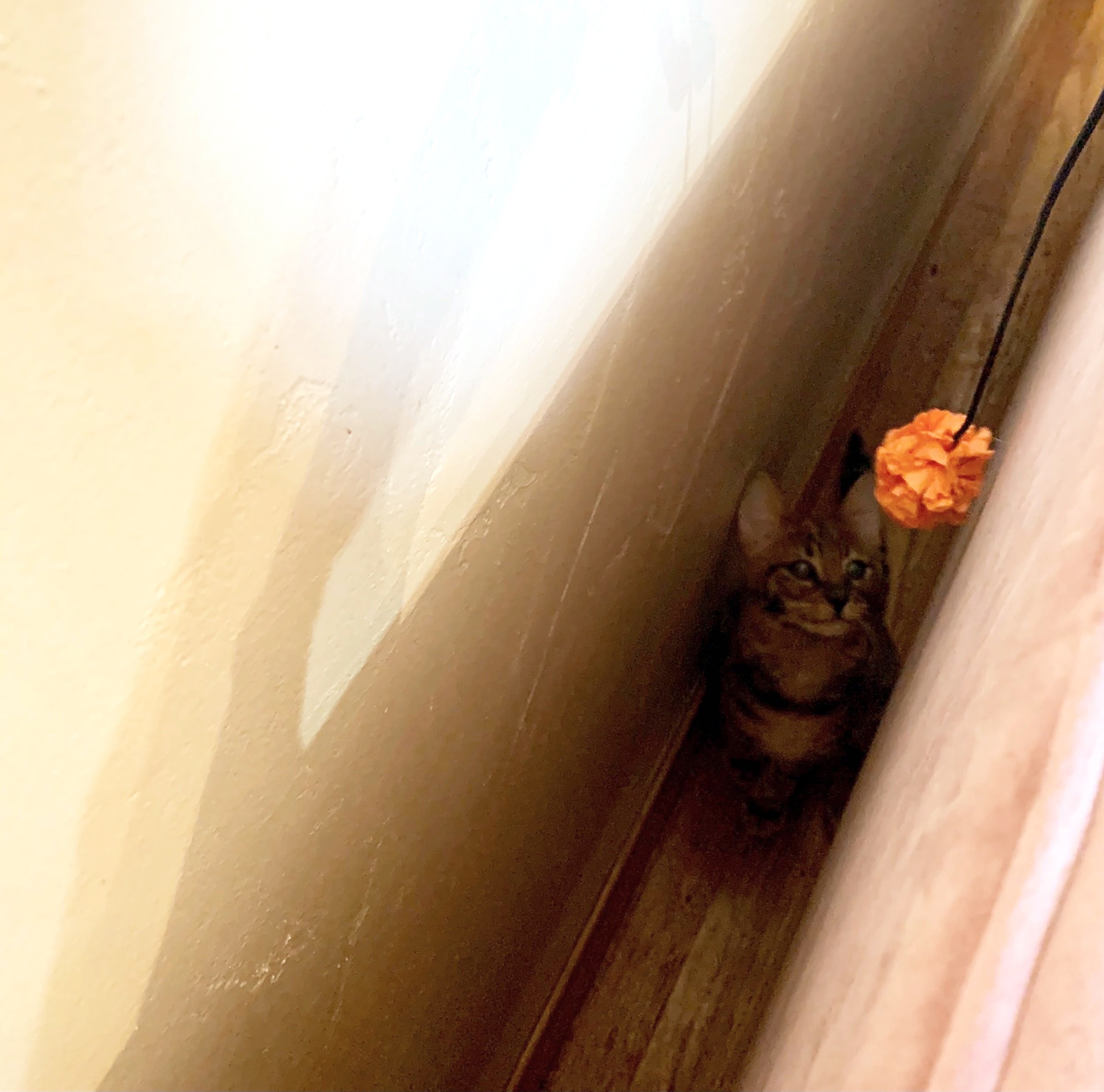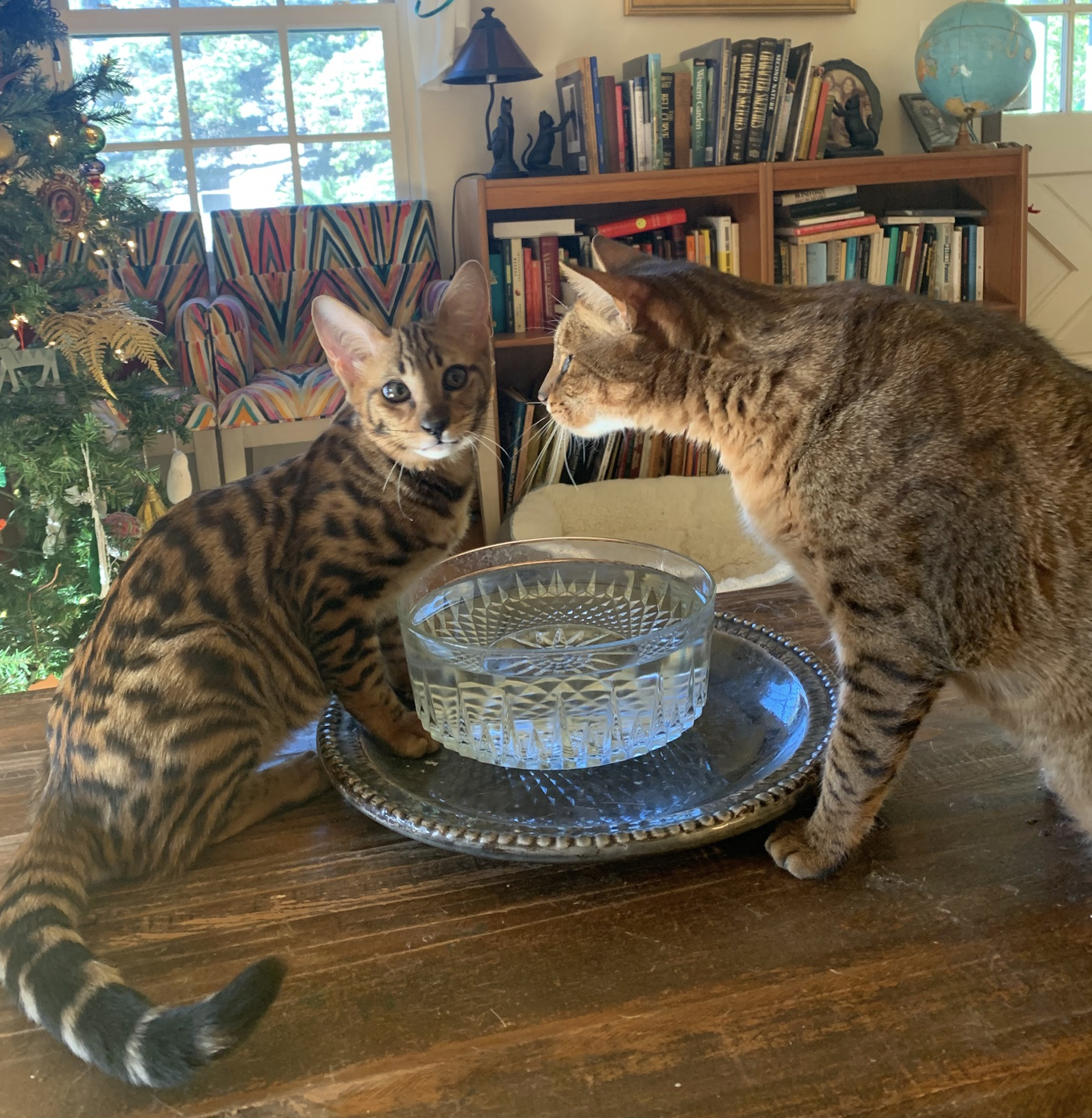Help! My New Savannah Kitten Hates Me! What Should I Do?
By Kristine C. Alessio, Gattobello Savannahs, former TICA Regional Director, SW Region.
Having a new kitten is a wonderful experience, especially a Savannah kitten. You have a new family member to be with you for years. For your new kitten, they're embarking on a journey away from their mother, siblings, and home—and this can be terrifying. As a breeder, I'd send my kitten buyers' home with a new kitten package of vet records, food, and advice on their kitten's transition to a new home. Thankfully, I've never had a buyer go through a scared kitten phase, but I did expect it.
Buying my first non-Savannah show cat taught me that even the friendliest kitten can have a long adjustment period after leaving the breeder's home. When Fuzzy (SGCA HMS Fuzzy Licks), a beautiful blue and white British Shorthair kitten, arrived at my house, he was terrified. He hid under my daughter's bed for three or four weeks. During the second week, I called his breeder, a highly respected TICA judge, and asked, "What's wrong with him, he's supposed to be a show cat and a child's pet, and all he does is hide!?". The breeder answered, "He was an outgoing kitten; he's shell shocked—go easy. As long as he's in his room, eating, and using his litterbox, don't worry". After the third or fourth week, Fuzzy played. After that, he was the perfect show cat, great in the Junior Exhibitor ring with his then five-year-old owner (my daughter Emily). He won "Best TICA British Shorthair Alter" for two years. And this from the kitten that hid and was afraid to be touched for over three weeks. I thought back to the breeder's advice and began adding this to my new-kitten packages.
Fast forward 15 years, and my only kitten experience is with rescues that came to me with their eyes still closed—and my F4 Savannah "Shackleton." There hadn't been an outside kitten in my house in years. While talking to Lynda Ryskamp at Salem's Pride Savannahs about pedigrees, I mentioned I'd cut off my right arm to have an F2 male from my favorite lines when I was breeding (Gattobello Firework, Gattobello Spitfire, Gattobello Firefly). As it turned out, Lynda had Spitfire's F1 daughter, and she had 3-week-old kittens, including a boy. When I saw Winston (Sir Winston Catchill) as a tiny kitten, I knew it had to be! Winston would fly to San Diego in the main cabin with a kitten nanny. When his brother suddenly became available (he was mistaken for a girl but was a boy), Feline Marshall Montgomery (Monty) also became mine—because two kittens are always better than one!
I couldn't wait to meet them as we prepared the kitten room with new toys, beds, and food. I counted down the minutes to their flight from Detroit to San Diego to get in. When Winston and Monty arrived with their pet nanny, they were together in the carrier in tiny harnesses. Winston had just had his neuter a few days prior. Once home, I opened their carrier. Monty had pooped, and they were smelly and MAD—even madder after the clean-up. They were growling, spitting, and hissing, very angry, scared kittens. My heart sank, but I remembered my own advice, so I put down their food and left them alone.
The following day, I peeked in, and they hadn't eaten—but did use the litterbox. I left them alone. On the second day, they started to eat. They were beginning to play a tiny bit with a feather toy on the third day. But they'd hiss, spit and growl at me. They'd run and hide if I stood up. I continued my progress, and slowly they settled into their toys, treats, and space. By the third week at my house, they'd returned to normal kitten behavior. Gone were the tiny hellions that wished they could eat me, bite or have me gone. Monty is a lap cat, loves his mommy (me), and Winston, though he isn't keen on being picked up, will rub all over my legs and sit with his head on me. They're precisely how every new owner wants their new Savannah kitten to be, friendly, confident, and outgoing.
So, what went right? What do you do when your new kitten arrives and hides, growls, hisses, spits, and won't eat? It's easy to blame the breeder or think your kitten isn't socialized. But that isn't always the case, and my advice is practical, straightforward, and works.
Do:
realize your kitten is hiding or acting aggressive because they are scared. It's a lot for a kitten to go through going to a new home.
have a kitten room with no other pets, toys, and things for the kitten to explore. Let your kitten feel that this room is a sanctuary--a safe place to eat, play, and use the litter box without intrusion from people or other pets.
use food to get him to associate good things with you. Chicken baby food is a commonly used reward for show cats, and it works too. Dried chicken treats work wonders. So does what I refer to as "cat crack" Friskies prime filets.
use toys as a way of getting your kitten used to you. Few Savannah kittens can hold out for very long when a Da Bird or similar wand toy is flying around.
move the toy across your body and let him walk on you without trying to pick him up or pet him.
put an item of your clothing in his room so he can get used to your smell.
keep a bed or blanket from the breeder's home in his room when he first arrives.
use a Feliway plug-in. Not all cats react to it, but it usually has a calming effect.
reach out to your breeder with concerns. Most breeders have good advice about your kitten, having raised him or her from the day of birth. They have insight into his likes and dislikes. Keep your breeder posted on your kitten’s progress. Breeders want to know how their kittens are doing and want both you, the buyer, and the kitten to be happy.
Don't:
force attention, petting, handling, etc., on him. Most cats, most Savannahs, don't want to be held.
introduce other cats or pets while your kitten is still hiding and scared.
remove your scared kitten from his hiding place, whether under a bed, sofa, a cat tree. He needs his safe place.
run the vacuum or any other noisy household appliance in his room; clean up can wait.
approach him when using the litterbox; he needs to be safe there of all places.
allow small children in his room when he is hiding. The noise and movements of small children can be scary to cats. As a Mom who bred cats throughout my daughter's younger years, I learned kittens could be terrified of little kids.
Once you’ve done all the Do's and avoided the Don'ts, your kitten will likely start interacting with you. Once you’ve established his trust, slowly move on to petting, letting others interact, meet children, and eventually other pets. The key is PATIENCE in abundance. Your kitten may hide for four weeks or even six weeks, but it doesn’t mean they’ll hide forever or always be untouchable.






